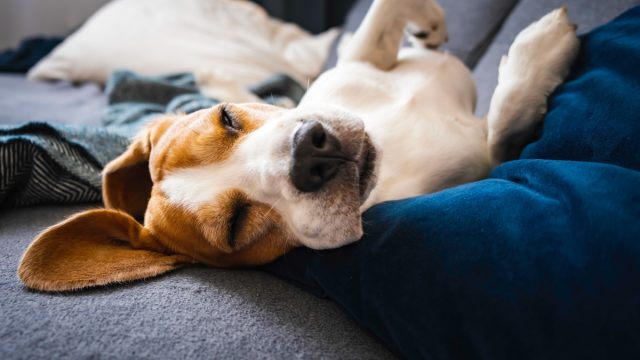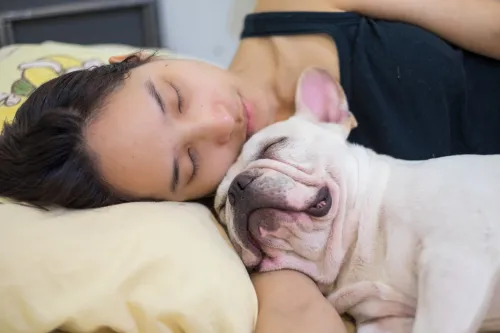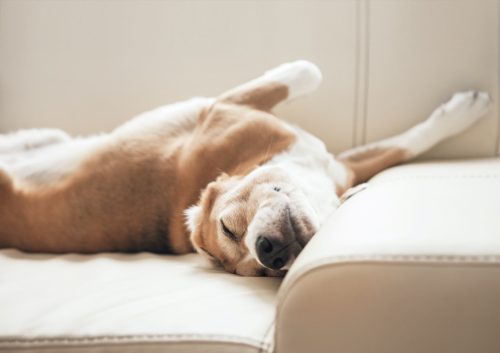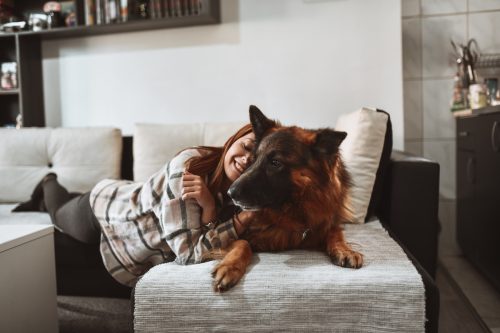The Real Reason You Should Never Wake a Sleeping Dog, Vet Warns

If you assumed the metaphor “let sleeping dogs lie” was nothing more than an old wives’ tale, veterinarians recently spoke out to set things straight. Whether it’s your own pet or a pooch taking a nap in the park, waking sleeping dogs can actually cause serious issues, according to these animal experts. Keep reading for their explanation of why and to better understand your dog’s sleep cycle.
RELATED: 14 Hardest Dog Breeds to Own, Doggy Daycare Worker Says.
Dogs sleep a lot—but for good reason.

If you’ve ever lived with a dog, we don’t have to tell you how much of their day is spent sleeping. Sure, sometimes they take a snooze because they’re bored, but dogs actually require so much sleep because it “helps restore their immunity and repairs damaged cells in their bodies,” explains Catrin George, animal wellbeing specialist at Animal Friends Pet Insurance, in an interview with Newsweek.
According to the American Kennel Club (AKC), on average, dogs spend about half of their day asleep and “30 percent awake but relaxing, and just 20 percent being active.” These numbers fluctuate for puppies, older dogs, and large dog breeds.
RELATED: The 10 Most Unique Dog Breeds, According to Pet Experts.
Dogs have similar sleep patterns to humans.

But despite requiring so much more sleep than humans, dogs do have similar sleep cycles to us. George told Newsweek that, like people, dogs eventually enter REM (rapid eye movement) sleep. This is considered the deepest sleep cycle, and it’s when both dogs and humans dream.
However, the AKC explains that while humans spend about 25 percent of their sleeping hours in the REM cycle, it’s only about 10 percent for dogs “because of their irregular sleep patterns.” Therefore, they require more overall sleep to compensate for this.
The REM cycle is when you really don’t want to wake a sleeping dog.

“Entering sleep, [dogs] take about 10 minutes to transition from the slow wave—during which breathing slows, blood pressure drops, and heart rate decreases—into rapid eye movement (REM),” the AKC breaks down. “In the REM phase, their eyes roll under closed lids, and their body might react to dreams.”
George shared with Newsweek that this might cause them to “twitch their ears, eyes, legs, or tail.” They also might sleep on their sides during this time.
And since they’re in such a deep sleep and potentially dreaming, it’s exactly the wrong time to startle a dog awake. They may be disoriented and jump, scratch, or even bite, notes Newsweek.
RELATED: 9 Low-Maintenance Dogs You Barely Need to Walk.
But avoid waking them altogether if you can.

It may be difficult to know when your dog has entered the REM cycle of sleep, so it’s advisable to avoid waking them anytime they’re dozing. However, Mondrian Contreras, DVM, veterinarian at Carol Stream Animal Hospital in Illinois, shared with Newsweek that there are other reasons, too.
“There are also medical conditions such as hearing loss, arthritis, and back injuries that can cause dogs to be more reactive if abruptly startled awake,” he explained. “This intense reaction can result in them injuring themselves, or the sudden increased physical discomfort may cause them to instinctively snap or growl due to the flight-or-fight response.”
Here’s what to do if you must wake a sleeping dog.

If you must wake a sleeping dog, the experts at dog walking company Rover suggest softly saying their name so as not to startle them or putting “a tasty treat under their nose to make waking up a more positive experience.”
For more pet advice delivered straight to your inbox, sign up for our daily newsletter.